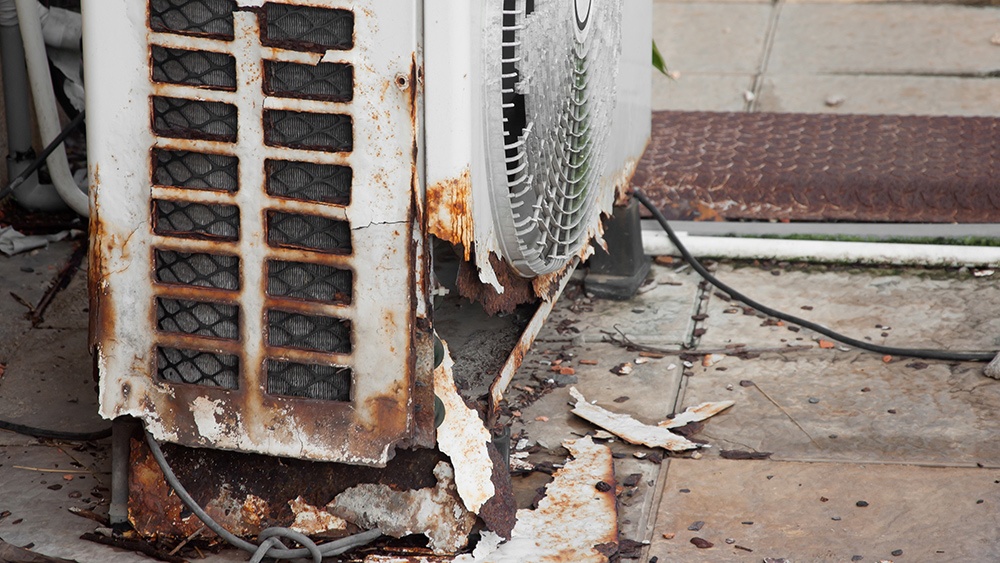
Unfortunately, an A/C disaster can occur at any moment. Here are the most common reasons why cooling catastrophes happen in your home (and how you can take precautions against them):
The air conditioner won’t start when you need it most. What’s happening when the unit just won’t start? It’s always on the hottest day of the summer, and here’s what’s happening:
- It’s not receiving power. The simplest answer is that it’s accidentally unplugged. It could be a more serious problem like a defective breaker or a burned or disconnected wire, which needs an HVAC expert.
- A part is faulty. The motor, transformer, or capacitor might be on their final days. If you need a replacement part or a new unit, contact a local professional for an estimate.
- The wires are chewed through. Critters eat low-voltage wires, leaving the unit without a circuit.
- The circuit breaker tripped. Most likely to occur after a power surge from a thunderstorm, a tripped circuit breaker is fixed by switching the power back into the “on” position. If it trips again, call the pros.
- The air filter is clogged. Replace the air filter monthly to avoid poor indoor air quality, reduced airflow, an iced-over unit, or a shutdown.
- The thermostat is off. Set the programmable thermostat to “cool” then adjust the temperature to at least 5 degrees Fahrenheit below the indoor temperature.
- The condensate drain is full. Gunk clogs the condensate drain line, creating an overflow of water from the cold evaporator coil that could leak into your unit.
- The garden is in the way. Extensive vegetation, grass, leaves, and other natural debris get sucked into the A/C vents, causing damage to the capacitor.
The unit isn’t the right size. You need the right size air conditioner for your home to avoid inadequate home cooling. Talk to a professional about which air conditioner size is right for your home, or visit How To Choose The Ideal Air Conditioning Unit and 4 Heating And Air Conditioner Systems To Know to grasp the basics.
The air conditioner is loud. The noise level of a unit increases if the isolation pads are worn, crumbled, or broken. Other common culprits include the following:
- Too-tight refrigeration lines
- A loose piece of hardware
- A failing motor
- Debris in the compressor fan
- An aged or malfunctioning compressor or blower motor
- A worn or misaligned belt
The air conditioning unit doesn’t work in bad weather. On 100-degree-Fahrenheit days, the A/C unit might not be able to start due to the hot weather. Other poor weather conditions, including humidity, heavy winds, and flooding, cause unit wear and tear, high energy bills, and blockage.
This means a repair or replacement is in your future sooner than you thought. Here’s how to protect the unit in bad weather.
It’s blowing hot air. The last thing you want is for your A/C unit to blow sticky, hot air and steam during the summer. Here’s a list of culprits to this muggy indoor air:
- Poor airflow. This causes debris and dirt circulating throughout your home. This build-up in a clogged air filter leads to reduced cooling as well as allergies and asthma.
- Dusty evaporator coils on the indoor A/C unit interfere with the unit’s ability to cool your home, which can make the unit blow hot air. The evaporator coil can also freeze, which blocks cool air from flowing and allows the fan motor’s heat to blow warm air.
- The plug is loose on the outdoor condenser. Even though the indoor fan may continue to run, the system won’t cool the air.
For solutions to these air conditioning problems, check out 5 Reasons Your Air Conditioning Is Blowing Hot Air.
To continue summer prep around your home, download Warner Service’s preparation checklist by clicking on the button below:


